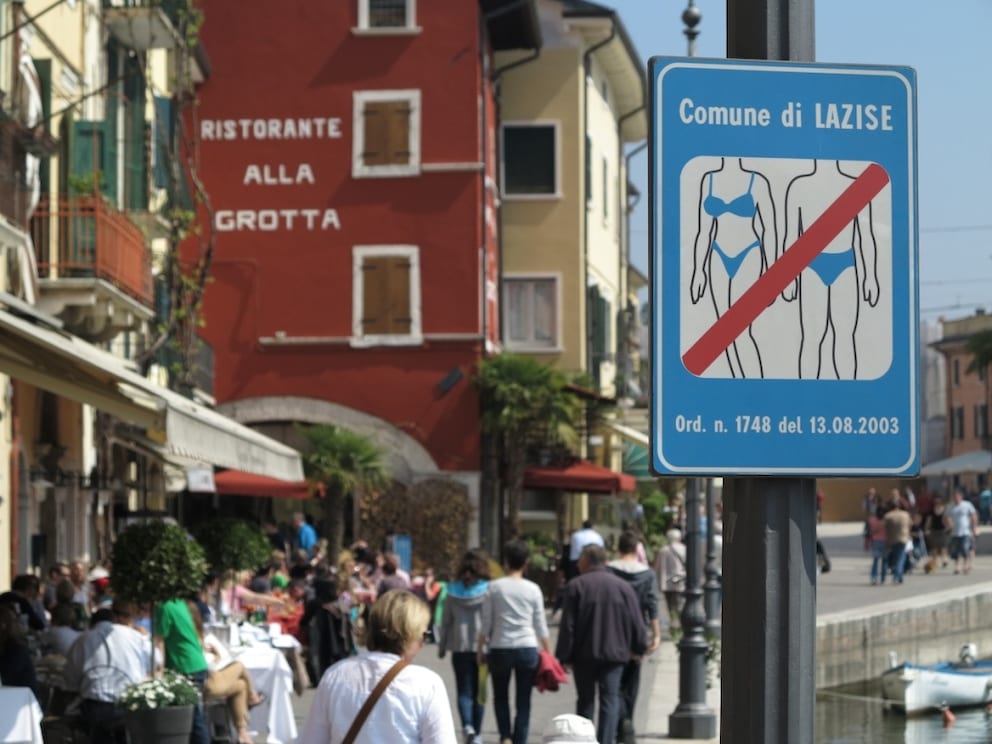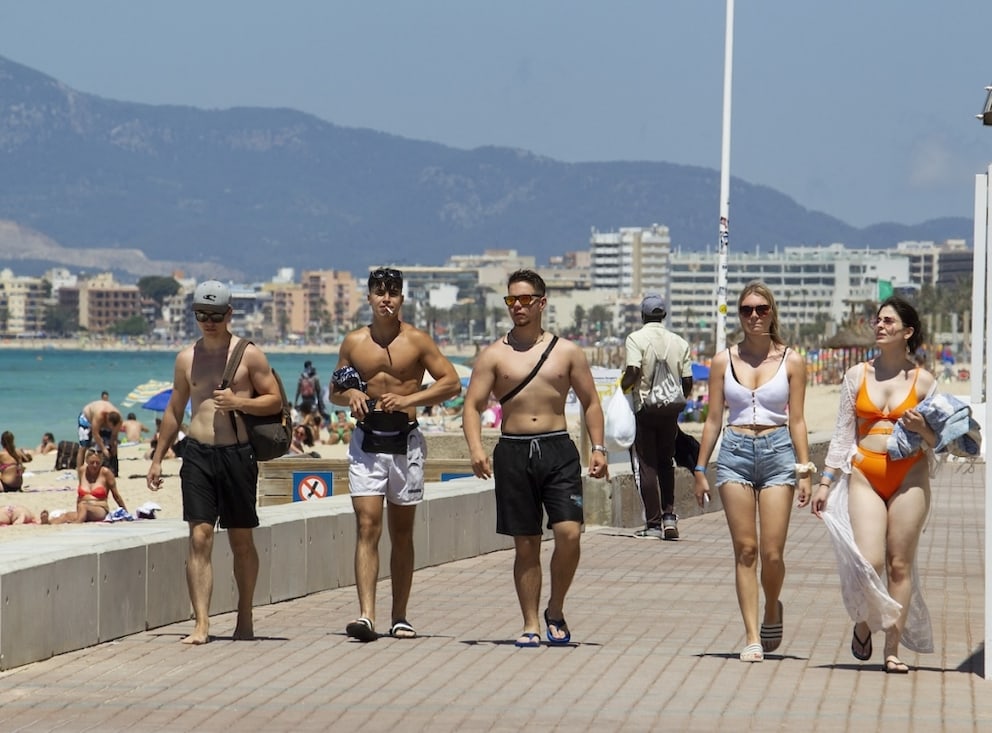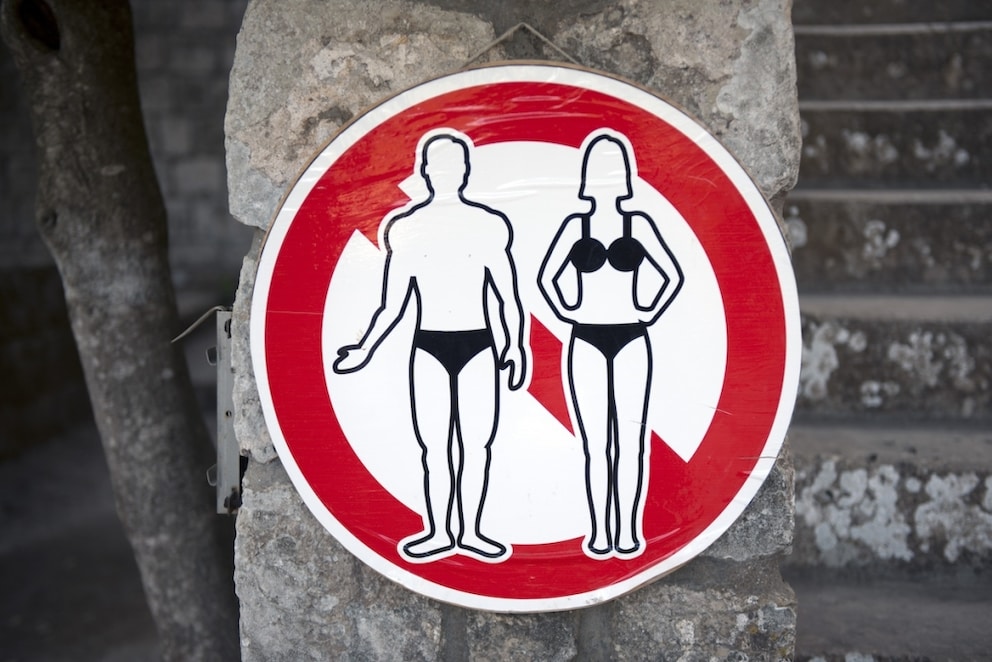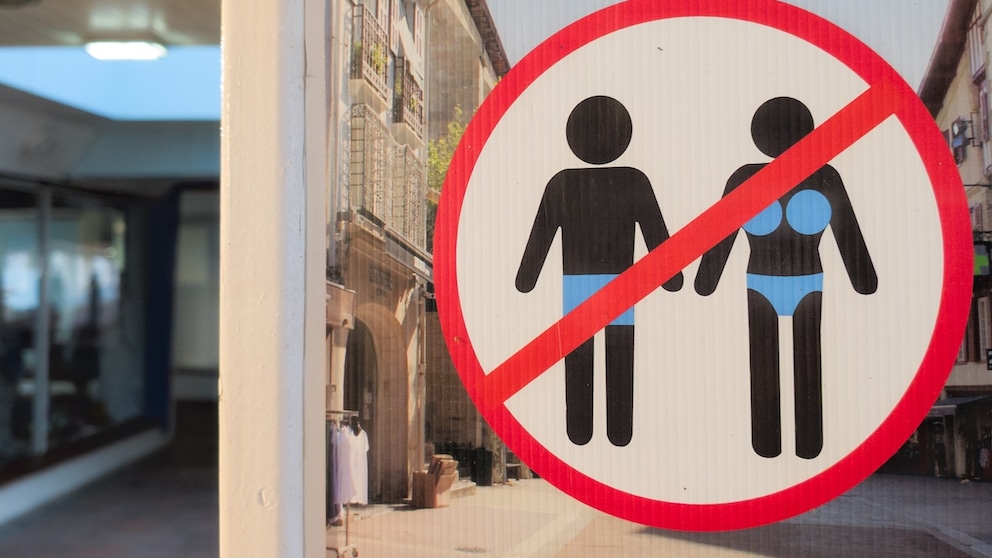March 4, 2025, 9:46 am | Read time: 6 minutes
In hot summer temperatures, you can walk a few meters from the beach to the hotel in swimming trunks or a bikini — that’s what many holidaymakers think. But it’s time to rethink! Because more and more places are banning people from walking in swimwear and sometimes imposing hefty fines for violations.
There seem to be many reasons to save on clothes on vacation. At the height of summer, it is often oppressively hot at popular destinations in Italy, Portugal, or Croatia. So, you don’t necessarily “need” an extensive wardrobe, at least for temperature reasons. What’s more, you can save the few items of clothing that fit in your luggage for other occasions. But let’s be honest: would you also walk through the streets in a bikini or swimming trunks at home if you didn’t feel as anonymous as on vacation? Probably not. So it has something to do with respect and is, therefore, not entirely incomprehensible that many locals in popular tourist resorts are increasingly bothered by the sight of half-naked tourists. In the future, they would no longer have to do so in various towns and municipalities. TRAVELBOOK shares some of the resort destinations that ban swimwear below.
Overview
Vacation Resorts in Italy That Ban Swimwear
Lignano Sabbiadoro, a seaside resort on the Italian Adriatic, imposed such a ban in May last year. Previously, the dress code had been left to “people’s common sense and decency.” However, this led to countless women and men strolling through the town scantily clad, which offended the locals — not least because it damaged the reputation of Lignano Sabbiadoro. It is now officially forbidden for people over the age of 12 to wear swimwear in public places. Violators face fines of 25 euros or more — repeat offenders have to pay up to 500 euros.
Similar regulations apply in other Italian seaside resorts. In Lazise on Lake Garda, for example, signs in the town have been pointing out the ban for some time. There is also a ban in Sorrento, the village of Baia Domizia, Campania, and Viareggio in Tuscany. The municipality of Milano Marittima in Emilia Romagna and nearby Riccione also have corresponding regulations. In Liguria, the towns of Rapallo and Santa Margherita have followed suit. The second town goes one step further: between 9 p.m. and 6 a.m., alcohol is banned in public places.

Where Strolling Around in Swimming Trunks and Bikinis Is Prohibited in Spain
A different wind has also been blowing in Platja d’Aro since last summer. Although alcohol is not directly banned there, other types of behavior that were previously often seen in the town, which is known as a party destination, have been made punishable. This includes, for example, appearing too lightly dressed and carrying around sex dolls — yes, you read that right. Why would you do this? Platja d’Aro is a popular destination for debauched stag parties. According to dpa information, the city council wants to curb “offensive behavior” with the bans. This includes wearing swimwear outside beach or pool areas, which is punishable by a fine of around 300 euros.
In Palma de Mallorca, wearing swimwear on the street has been banned for more than ten years. In 2014, the “Ordenanza Cívica” ordinance was passed, which not only prohibits strolling around in bikinis or swimming trunks but also criminalizes shell games, street prostitution, public binge drinking, and intrusive begging. This was reported by Mallorca Magazin. Those who do not adhere to the rules will be fined between 100 and 200 euros. However, the ban is not consistently enforced — especially in party strongholds such as El Arenal, Magaluf, or even Palma, lightly clad tourists are still part of the street scene. However, it is possible that the island will follow the example of other seaside resorts, which are now enforcing the ban more strictly. Especially as Mallorca has had a relatively strict dress code for some time now: more and more establishments are refusing entry to guests who appear in strapless tops or soccer shirts.

Croatia: Swimwear Gets Expensive in These Vacation Resorts
A ban on wearing swimwear on the streets was also introduced a while ago on the Croatian vacation island of Hvar. At least in the historic town center, visitors have had to be fully clothed since 2017. Otherwise, there is a fine of up to 600 euros. In the meantime, walking around in swimming trunks, bikinis, or swimsuits has also been banned in some other Croatian coastal towns. In Split, for example, signs that have been posted for years have been deliberately ignored for a long time. Those who don’t want to listen will have to pay in the future. According to a report in Heute, inappropriate clothing on the streets of Split and Dubrovnik costs around 150 euros. Here, too, the ban on bikinis goes hand in hand with a ban on alcohol outside restaurants.


New strict rules Anyone who pees in the sea at this Spanish resort has to pay a fine of 750 euros

Information for Travelers Where You Are Not Allowed to Drink on the Street in Europe

TRAVELBOOK author reveals ‘Why I Still Love the Old Town of Lagos After Ten Years’
First City in Portugal Follows Suit
If you’ve ever been on vacation in Portugal, you may have noticed that the local men — no matter how hot it is — generally wear long legwear. It is appreciated when foreign visitors follow suit and dress appropriately for restaurant visits, for example. The recent official ban on swimwear in Albufeira could help here. True, the small town is known as a party stronghold — but it no longer wants to be. Especially as party animals have not always limited themselves to a good, exuberant mood but have also been disturbingly loud, and some have shamelessly urinated in public. But back to bikinis and swimming trunks. According to a report in the daily newspaper Correio da Manhã, anyone caught wearing them on the streets of Albufeira will have to pay between 300 and 1500 euros.
These are just a few of the many resorts that want to ban swimwear from the streets. It would go beyond the scope of this article to list all the small municipalities and areas concerned. Travelers should inform themselves locally about the applicable regulations — or even better, always wear something over a bikini or swimming trunks when they leave the bathing area. By doing so, you ensure that you respect local customs and avoid offending anyone.

